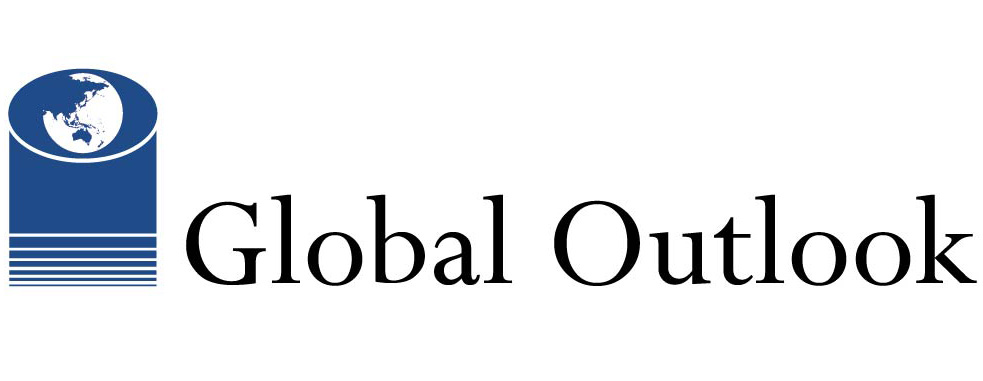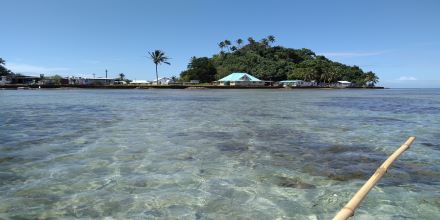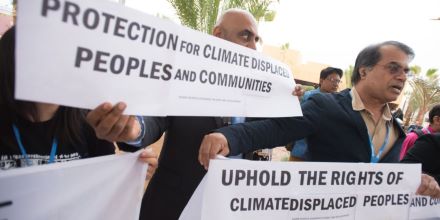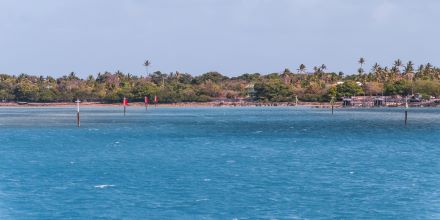
Curated expert opinion on intractable contemporary issues
Global Outlook: Climate Change and Conflict
Why Pacific Islanders are Staying Put Even as Rising Seas Flood Their Homes and Crops
By Merewalesi Yee, Annah Piggott-McKellar, Celia McMichael and Karen E. McNamara
| 13 January, 2023
Climate change is forcing people around the world to abandon their homes. In the Pacific Islands, rising sea levels are leaving communities facing tough decisions about relocation. Some are choosing to stay in high-risk areas.
India at COP-27: Did It Prevail?
By Robert Mizo | 07 December, 2022
That India is a key actor at the international climate negotiation table was well displayed at the recently concluded Convention of Parties (COP) 27 at Sharm El-Sheikh. The summit which sought a renewed solidarity among the parties to achieve the promises made at Paris in 2015 saw India being an assertive yet cooperative party to the United Nations Framework Convention on Climate Change (UNFCCC).
An Entire Pacific Country Will Upload Itself to the Metaverse
By Nick Kelly and Marcus Foth | 21 November, 2022
It’s a desperate plan – with a hidden message. The Pacific nation of Tuvalu is planning to create a version of itself in the metaverse, as a response to the existential threat of rising sea levels. Tuvalu’s minister for justice, communication and foreign affairs, Simon Kofe, made the announcement via a chilling digital address to leaders at COP27.
Filling the Basket of Knowledge: Workshop on Climate Change, Human Mobility and Peacebuilding in the Pacific
By Volker Boege | 14 November, 2022
A recent workshop held in Wellington, New Zealand, explored the consequences of the hellish climate change scenario for the security and peace of communities and countries in the Pacific region. At the same time, participants searched for pathways off the highway to hell, tapping into the expertise and experiences of a diverse group of policymakers, practitioners and researchers from the Pacific and beyond.
The Climate Dispossessed are not Refugees
By Teall Crossen | 13 October, 2022
Let’s be clear, people displaced by climate breakdown are not climate refugees under international law. They are not being forced from their countries because of persecution by their own government. Nor are they migrants. They are not leaving in search of work or education, or to be closer to family. Rather, many millions of people are likely to be dispossessed from their homes by the choices of other countries to continue to pollute the atmosphere, without a legal framework to protect them.
Australia Violated The Rights Of Torres Strait Islanders By Failing To Act On Climate Change, The UN Says
By Kristen Lyons | 04 October, 2022
In a landmark decision, a United Nations committee on Friday found Australia’s former Coalition government violated the human rights of Torres Strait Islanders by failing to adequately respond to the climate crisis.
The views and opinions expressed in Global Outlook are those of the authors and do not necessarily reflect the official policy or position of Toda Peace Institute.
Why Pacific Islanders are Staying Put Even as Rising Seas Flood Their Homes and Crops
By Merewalesi Yee, Annah Piggott-McKellar, Celia McMichael and Karen E. McNamara | 13 January, 2023
Climate change is forcing people around the world to abandon their homes. In the Pacific Islands, rising sea levels are leaving communities facing tough decisions about relocation. Some are choosing to stay in high-risk areas.
India at COP-27: Did It Prevail?
By Robert Mizo | 07 December, 2022
That India is a key actor at the international climate negotiation table was well displayed at the recently concluded Convention of Parties (COP) 27 at Sharm El-Sheikh. The summit which sought a renewed solidarity among the parties to achieve the promises made at Paris in 2015 saw India being an assertive yet cooperative party to the United Nations Framework Convention on Climate Change (UNFCCC).
An Entire Pacific Country Will Upload Itself to the Metaverse
By Nick Kelly and Marcus Foth | 21 November, 2022
It’s a desperate plan – with a hidden message. The Pacific nation of Tuvalu is planning to create a version of itself in the metaverse, as a response to the existential threat of rising sea levels. Tuvalu’s minister for justice, communication and foreign affairs, Simon Kofe, made the announcement via a chilling digital address to leaders at COP27.
Filling the Basket of Knowledge: Workshop on Climate Change, Human Mobility and Peacebuilding in the Pacific
By Volker Boege | 14 November, 2022
A recent workshop held in Wellington, New Zealand, explored the consequences of the hellish climate change scenario for the security and peace of communities and countries in the Pacific region. At the same time, participants searched for pathways off the highway to hell, tapping into the expertise and experiences of a diverse group of policymakers, practitioners and researchers from the Pacific and beyond.
The Climate Dispossessed are not Refugees
By Teall Crossen | 13 October, 2022
Let’s be clear, people displaced by climate breakdown are not climate refugees under international law. They are not being forced from their countries because of persecution by their own government. Nor are they migrants. They are not leaving in search of work or education, or to be closer to family. Rather, many millions of people are likely to be dispossessed from their homes by the choices of other countries to continue to pollute the atmosphere, without a legal framework to protect them.
Australia Violated The Rights Of Torres Strait Islanders By Failing To Act On Climate Change, The UN Says
By Kristen Lyons | 04 October, 2022
In a landmark decision, a United Nations committee on Friday found Australia’s former Coalition government violated the human rights of Torres Strait Islanders by failing to adequately respond to the climate crisis.
The views and opinions expressed in Global Outlook are those of the authors and do not necessarily reflect the official policy or position of Toda Peace Institute.





